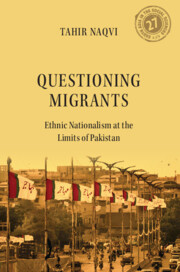4 - The One, Divisible
Published online by Cambridge University Press: 13 November 2024
Summary
Like the military coups that give them life, projects of extra-constitutional political reform are “reflective and transformative occasions, moments between and betwixt ordinary times, when axiomatic values are invoked even as they are questioned and reformulated” (Coronil 1997: 124). Pakistan's head of state Field Marshal Muhammad Ayub Khan ruled under martial law from 1958 to 1961 and then as president under a constitution of his regime's own design until a mass-resistance campaign led to his regime's demise in 1969. His administration relied upon emergency powers to contain regional and leftist political forces that had become increasingly aligned in the years preceding the coup against the centralizing tendencies of the postcolonial state. Paying attention to the discursive, spatial, and institutional connections between the powers of exception and the regulation and agency of everyday citizens, this chapter examines cultural and spatial pedagogies of nation-state building and citizenship that were launched in the context of Pakistan's first military dictatorship.
Much of this work in nation-state building took place under the Bureau of National Reconstruction, a “revolutionary” state institution created shortly after the 1958 coup. The bureau spearheaded two significant projects of authoritarian political reform. The first sought to impose a unitary Muslim national subject to the exclusion of native ethnic and regional identities, an initiative that centered Urdu, north Indian Islamicate history, and, to a related and lesser degree, Urdu-speaking Muhajirs as pedagogical models of Muslim nationality. This project was launched in conjunction with another initiative also housed within the bureau known as the “Basic Democracies” (BD) scheme. It sought to remake Pakistan's electoral-political landscape by limiting electoral franchise to locally bounded constituencies, leaving Pakistani citizens with few mechanisms at their disposal to represent problems – such as the inequities arising from industrial and agrarian capitalist control, and the growing economic and political dominance of Punjab – that confronted the nation at large. Both projects were part of a larger and coherent extra-constitutional strategy to enhance centralized state control over the country's provincial units (F. Ahmad 1998; Ayres 2009; F. H. Siddiqui 2012; Caron 2016).
- Type
- Chapter
- Information
- Questioning MigrantsEthnic Nationalism at the Limits of Pakistan, pp. 85 - 104Publisher: Cambridge University PressPrint publication year: 2025

